Notes
- ↑ Jane Austen book cover. books.google.com.
- 1 2 Claudia L. Johnson. www.princeton.edu. Retrieved on 8 July 2007.
Claudia L. Johnson is the Murray Professor of English Literature at Princeton University; she is also currently chairperson of the English department. Johnson received her PhD from Princeton University; she specializes in Restoration and 18th century British literature, with an especial focus on the novel. She is also interested in feminist theory and gender studies. Johnson is renowned for her books on Jane Austen and Mary Wollstonecraft.
Johnson's major books include Jane Austen: Women, Politics, and the Novel (Chicago, 1988) and Equivocal Beings: Politics, Gender and Sentimentality in the 1790s (Chicago, 1995). She also edited The Cambridge Companion to Mary Wollstonecraft (Cambridge, 2002) as well as editions of Jane Austen's Mansfield Park (Norton, 1998), Sense and Sensibility (Norton, 2002), and Northanger Abbey (Oxford, 2003).
Nina Auerbach has called Equivocal Beings the "definitive account of Wollstonecraft, [Ann] Radcliffe, and [Fanny] Burney . . . It should become one of the classic feminist accounts, not just of the late eighteenth century, but of all women writers in their time" and Margaret Anne Doody writes that Jane Austen is "brilliant, witty and well-informed book . . . the best single book on Austen for a decade or more—and one of the best ever." [1]
"She is now putting the finishing touches on a book about author-love called Jane Austen’s Cults and Cultures, which traces permutations of “Jane mania” from 1817 to the present, and also working on another called Raising the Novel, which explores modern efforts to create a novelistic canon by elevating novels to keystones of high culture." [2]
She has been awarded Guggenheim Fellowships and grants by the National Endowment for the Humanities. [2]

A Vindication of the Rights of Woman: with Strictures on Political and Moral Subjects (1792), written by the 18th-century British proto-feminist Mary Wollstonecraft, is one of the earliest works of feminist philosophy. In it, Wollstonecraft responds to those educational and political theorists of the 18th century who believed that women should not receive a rational education. She argues that women's education ought to match their position in society, and that they are essential to the nation because they raise its children and could act as respected "companions" to their husbands. Wollstonecraft maintains that women are human beings deserving of the same fundamental rights as men, and that treating them as mere ornaments or property for men undercuts the moral foundation of society.
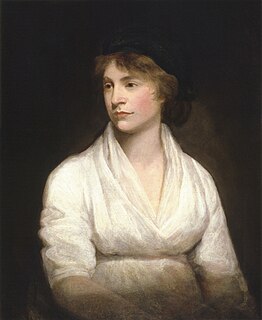
Mary Wollstonecraft was an English writer, philosopher, and advocate of women's rights. Until the late 20th century, Wollstonecraft's life, which encompassed several unconventional personal relationships at the time, received more attention than her writing. Today Wollstonecraft is regarded as one of the founding feminist philosophers, and feminists often cite both her life and her works as important influences.
Elaine Showalter is an American literary critic, feminist, and writer on cultural and social issues. She is one of the founders of feminist literary criticism in United States academia, developing the concept and practice of gynocritics, a term describing the study of "women as writers".
Mary Louise Poovey is an American cultural historian and literary critic whose work focuses on the Victorian Era. She is currently Samuel Rudin University Professor in the Humanities at New York University, and Director of the Institute for the History of the Production of Knowledge. Poovey has taught at Johns Hopkins University, Swarthmore College, and Yale University.
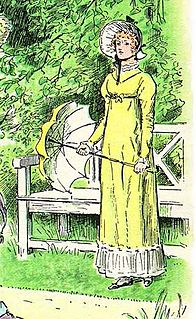
Elizabeth Bennet is the protagonist in the 1813 novel Pride and Prejudice by Jane Austen. She is often referred to as Eliza or Lizzy by her friends and family. Elizabeth is the second child in a family of five daughters. Though the circumstances of the time and environment push her to seek a marriage of convenience for economic security, Elizabeth wishes to marry for love.

Sensibility refers to an acute perception of or responsiveness toward something, such as the emotions of another. This concept emerged in eighteenth-century Britain, and was closely associated with studies of sense perception as the means through which knowledge is gathered. It also became associated with sentimental moral philosophy.

A Vindication of the Rights of Men, in a Letter to the Right Honourable Edmund Burke; Occasioned by His Reflections on the Revolution in France (1790) is a political pamphlet, written by the 18th-century British liberal feminist Mary Wollstonecraft, which attacks aristocracy and advocates republicanism. Wollstonecraft's was the first response in a pamphlet war sparked by the publication of Edmund Burke's Reflections on the Revolution in France (1790), a defense of constitutional monarchy, aristocracy, and the Church of England.
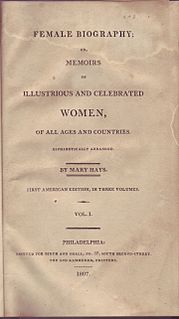
Mary Hays (1759–1843) was an autodidact intellectual who published essays, poetry, novels and several works on famous women. She is remembered for her early feminism, and her close relations to dissenting and radical thinkers of her time including Robert Robinson, Mary Wollstonecraft, William Godwin and William Frend. She was born in 1759, into a family of Protestant dissenters who rejected the practices of the Church of England. Hays was described by those who disliked her as 'the baldest disciple of [Mary] Wollstonecraft' by The Anti Jacobin Magazine, attacked as an 'unsex'd female' by clergyman Robert Polwhele, and provoked controversy through her long life with her rebellious writings. When Hays's fiancé John Eccles died on the eve of their marriage, Hays expected to die of grief herself. But this apparent tragedy meant that she escaped an ordinary future as wife and mother, remaining unmarried. She seized the chance to make a career for herself in the larger world as a writer.
Janet Margaret Todd OBE is a British academic and author. She was educated at Cambridge University and the University of Florida, where she undertook a doctorate on the poet John Clare. Much of her work concerns Mary Wollstonecraft, Jane Austen, and their circles.
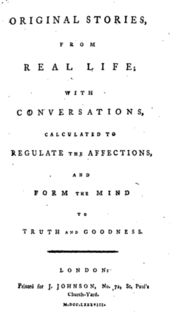
Original Stories from Real Life; with Conversations Calculated to Regulate the Affections, and Form the Mind to Truth and Goodness is the only complete work of children's literature by the 18th-century English feminist author Mary Wollstonecraft. Original Stories begins with a frame story that sketches out the education of two young girls by their maternal teacher Mrs. Mason, followed by a series of didactic tales. The book was first published by Joseph Johnson in 1788; a second, illustrated edition, with engravings by William Blake, was released in 1791 and remained in print for around a quarter of a century.

Mary: A Fiction is the only complete novel by 18th-century British feminist Mary Wollstonecraft. It tells the tragic story of a female's successive "romantic friendships" with a woman and a man. Composed while Wollstonecraft was a governess in Ireland, the novel was published in 1788 shortly after her summary dismissal and her decision to embark on a writing career, a precarious and disreputable profession for women in 18th-century Britain.
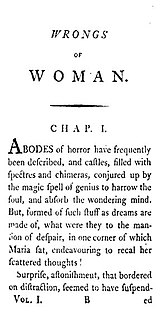
Maria: or, The Wrongs of Woman is the 18th-century British feminist Mary Wollstonecraft's unfinished novelistic sequel to her revolutionary political treatise A Vindication of the Rights of Woman (1792). The Wrongs of Woman was published posthumously in 1798 by her husband, William Godwin, and is often considered her most radical feminist work.
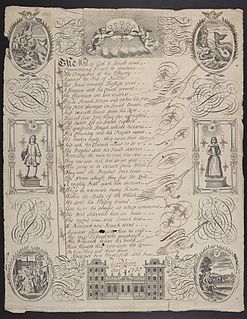
Thoughts on the education of daughters: with reflections on female conduct, in the more important duties of life is the first published work of the British feminist Mary Wollstonecraft. Published in 1787 by her friend Joseph Johnson, Thoughts is a conduct book that offers advice on female education to the emerging British middle class. Although dominated by considerations of morality and etiquette, the text also contains basic child-rearing instructions, such as how to care for an infant.
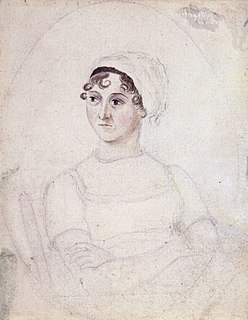
The reception history of Jane Austen follows a path from modest fame to wild popularity. Jane Austen (1775–1817), the author of such works as Pride and Prejudice (1813) and Emma (1815), has become one of the best-known and most widely read novelists in the English language. Her novels are the subject of intense scholarly study and the centre of a diverse fan culture.

Letters Written During a Short Residence in Sweden, Norway, and Denmark (1796) is a personal travel narrative by the eighteenth-century British feminist writer Mary Wollstonecraft. The twenty-five letters cover a wide range of topics, from sociological reflections on Scandinavia and its peoples to philosophical questions regarding identity. Published by Wollstonecraft's career-long publisher, Joseph Johnson, it was the last work issued during her lifetime.
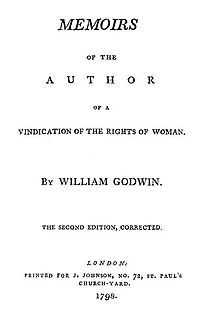
Memoirs of the Author of A Vindication of the Rights of Woman (1798) is William Godwin's biography of his late wife Mary Wollstonecraft. Rarely published in the nineteenth century and sparingly even today, Memoirs is most often viewed as a source for information on Wollstonecraft. However, with the rise of interest in biography and autobiography as important genres in and of themselves, scholars are increasingly studying it for its own sake.

The lifetime of British writer, philosopher, and feminist Mary Wollstonecraft (1759–1797) encompassed most of the second half of the eighteenth century, a time of great political and social upheaval throughout Europe and America: political reform movements in Britain gained strength, the American colonists successfully rebelled, and the French revolution erupted. Wollstonecraft experienced only the headiest of these days, not living to see the end of the democratic revolution when Napoleon crowned himself emperor. Although Britain was still revelling in its mid-century imperial conquests and its triumph in the Seven Years' War, it was the French revolution that defined Wollstonecraft's generation. As poet Robert Southey later wrote: "few persons but those who have lived in it can conceive or comprehend what the memory of the French Revolution was, nor what a visionary world seemed to open upon those who were just entering it. Old things seemed passing away, and nothing was dreamt of but the regeneration of the human race."

The term Janeite has been both embraced by devotees of the works of Jane Austen and used as a term of opprobrium. According to Austen scholar Claudia Johnson Janeitism is "the self-consciously idolatrous enthusiasm for 'Jane' and every detail relative to her".

Jane Austen's (1775–1817) distinctive literary style relies on a combination of parody, burlesque, irony, free indirect speech and a degree of realism. She uses parody and burlesque for comic effect and to critique the portrayal of women in 18th-century sentimental and gothic novels. Austen extends her critique by highlighting social hypocrisy through irony; she often creates an ironic tone through free indirect speech in which the thoughts and words of the characters mix with the voice of the narrator. The degree to which critics believe Austen's characters have psychological depth informs their views regarding her realism. While some scholars argue that Austen falls into a tradition of realism because of her finely executed portrayal of individual characters and her emphasis on "the everyday", others contend that her characters lack a depth of feeling compared with earlier works, and that this, combined with Austen's polemical tone, places her outside the realist tradition.
Audrey Bilger is the 16th and current president of Reed College. She is former vice president and dean of the college at Pomona College and previously was a professor of literature and faculty director of the Center for Writing and Public Discourse at Claremont McKenna College.